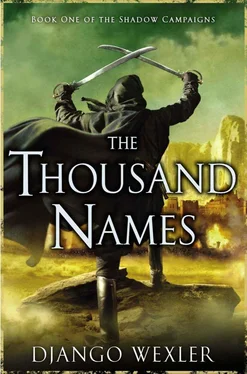Django Wexler - The Thousand Names
Здесь есть возможность читать онлайн «Django Wexler - The Thousand Names» весь текст электронной книги совершенно бесплатно (целиком полную версию без сокращений). В некоторых случаях можно слушать аудио, скачать через торрент в формате fb2 и присутствует краткое содержание. Жанр: Фэнтези, на английском языке. Описание произведения, (предисловие) а так же отзывы посетителей доступны на портале библиотеки ЛибКат.
- Название:The Thousand Names
- Автор:
- Жанр:
- Год:неизвестен
- ISBN:нет данных
- Рейтинг книги:4 / 5. Голосов: 1
-
Избранное:Добавить в избранное
- Отзывы:
-
Ваша оценка:
- 80
- 1
- 2
- 3
- 4
- 5
The Thousand Names: краткое содержание, описание и аннотация
Предлагаем к чтению аннотацию, описание, краткое содержание или предисловие (зависит от того, что написал сам автор книги «The Thousand Names»). Если вы не нашли необходимую информацию о книге — напишите в комментариях, мы постараемся отыскать её.
The Thousand Names — читать онлайн бесплатно полную книгу (весь текст) целиком
Ниже представлен текст книги, разбитый по страницам. Система сохранения места последней прочитанной страницы, позволяет с удобством читать онлайн бесплатно книгу «The Thousand Names», без необходимости каждый раз заново искать на чём Вы остановились. Поставьте закладку, и сможете в любой момент перейти на страницу, на которой закончили чтение.
Интервал:
Закладка:
He’d gotten a glimpse, in the flickering lamplight, of his superior’s face. So far in their association, Marcus had never seen the colonel lose his temper. He’d started to wonder, in fact, if the man was even capable of anger. Now that question was answered. Janus’ delicate features had been twisted into an almost unrecognizable snarl, and his great gray eyes seemed to glow from within with an awful light.
Marcus was out of breath by the time they pounded down the tunnel and reached the little shrine. He called out to the soldiers above to help them up, but before anyone could move the colonel caught the lip of the hole on a jump and hauled himself up. Argot hurriedly leaned down and extended a hand to Marcus, who handed the musket up and levered himself out of the hole, panting.
“What have you done with them?”
Janus’ voice was cold and precise again, but there was a dangerous edge to it that Marcus had never heard before, not even in battle. He raised his head and saw the colonel confronting the ancient priestess, who was held from the sides by two nervous-looking soldiers.
“Taken it beyond your reach,” the old woman said, her head raised in defiance. “Raschem.”
There was a frozen, silent moment. Janus’ hands tightened into fists, and he turned to the younger priestess, who cowered as best she could in the grip of her captors.
“Tell me where you have taken the Thousand Names,” he snapped.
The woman babbled something, her Khandarai too fast for Marcus to parse. It was apparently not what Janus wanted, however, because he stepped closer to her and growled, “Tell me, or-”
“Leave her be,” said the old woman. “She knows nothing.”
“And you do?”
“Only that Mother will not be found by the likes of you.”
Janus pressed his lips together. Then, speaking in Vordanai for the first time since he’d left the tunnel, he said, “Sergeant Argot, give me your knife, please.”
The soldiers, unable to follow the Khandarai, had watched this exchange with increasing puzzlement. Now Argot started and said, “My knife?”
“Yes, Sergeant.” Janus’ eyes never left the old woman.
Argot glanced at Marcus, but the colonel’s voice cracked like a whip.
“ Now , Sergeant.”
“Yessir!”
Argot drew a big skinning knife from a sheath at his belt, reversed it, and handed it to Janus. The colonel took it, hefted it thoughtfully, and looked at the old woman.
“Do what you like,” the priestess said. “It will not avail you.”
Marcus had finally caught his breath.
“Sir,” he said. When that drew no response, he added, “Janus.”
Janus blinked, then looked at Marcus. “Yes, Captain?”
“I just-” Marcus realized he had no idea what he wanted to say, except that he would rather not watch his commanding officer slice an old woman to ribbons. “I don’t think she knows, sir. Look at her.”
There was a long pause.
“No,” Janus said quietly. “I suppose not. If she did, they would not have left her behind.” He flipped the knife around deftly and handed it back to Argot. “Still, she may know something useful. Take them back to the Palace, both of them. The prince has people who specialize in this sort of thing.”
Marcus swallowed. But an order was an order. And even if he’d wanted to object, the colonel was already stalking toward the door.
WINTER
The big square in front of the barracks of the Heavenly Guard dwarfed the handful of blue-uniformed soldiers drilling in it. It had been built to allow the entire troop to parade at once, back in the days when the Guard had been an actual fighting formation instead of a sinecure for idiot sons of important families and worn-down servants. Sitting on the stone steps leading up from the packed-dirt field to the barracks building, Winter could see a half dozen companies going through their drills, but they filled barely a quarter of the space. It felt oddly disrespectful, like doing jumping jacks in a temple.
The Seventh Company was out there with the rest, going through the Manual of Arms and some standard evolutions. Winter would just as soon have let them rest, after everything they’d been through, but Graff had insisted that maintaining at least a bit of daily drill was important to morale. On reflection, Winter could see the point of this; the exercises were a touchstone, and they kept the soldiers from dwelling on those they had lost.
Winter had assigned Bobby to lead the drills today, partly so she herself could sit in the shade but mostly so she could keep an eye on the corporal. To all outward appearances, Bobby had recovered completely from the wound that she-it still felt odd to think of Bobby as “she,” even in the privacy of her own skull-had suffered in the charge against the Auxiliaries at Turalin. Close observation, however, revealed that something had changed. She didn’t seem to be in pain or short of breath, but she would occasionally stare distractedly into space until some sound from the men returned her attention to the here and now.
“Is something wrong with her?”
Winter looked up at the sound of Feor’s voice. The Khandarai girl had changed into a fresh wrap and wound a long white cloth around her broken arm, keeping it pinned at her side. Her hair, dark and straight, was tied in a simple tail.
“Be careful what you say, even in Khandarai.” Winter glanced around, but just now the two of them were alone on the steps, and none of the Vordanai on the field were close enough to overhear.
“My apologies,” Feor said. “You were staring at the corporal. Is something wrong?”
“I’m not sure,” Winter said. “ He seems okay, but he’s acting a bit. . oddly.”
“I am not surprised. Obv-scar-iot should have been bound to one of the sahl-irusk , someone trained to it from girlhood. I did not know if it would accept. . him.” Feor sat down next to Winter on the sun-warmed stone, balancing carefully with her good arm. “ Naath are unpredictable things. Mother would say that they have a temper.”
“Is it. . are they living things, then?”
“Not as you and I are alive, perhaps, but yes, in their own way.”
“If they have tempers, do they think ?”
Feor shook her head. “Think, no. They have desires. Not quite as a human has desires, but more in the manner a tree desires water and will push a taproot through flagstones to get it. It is a part of their basic nature.” She sighed. “Or so we believe. Mother says that we used to understand them better. Much has been lost to time.”
Winter’s eyes continued to follow Bobby. She leaned back against the step behind her. “I still can hardly believe I’m having this conversation.”
“Why?”
Winter glanced at Feor, wondering if that had been a joke, but the girl’s face was entirely serious. She took a couple of moments to compose her reply.
“If I told anyone in Vordan what you did that day,” she said eventually, “they wouldn’t believe a word of it.” Actually, she privately thought they would believe it, if she told them it had happened to a friend of a friend of hers in Khandar. People seemed to be willing to swallow any story provided it was thirdhand and a long way off. “They-we, I suppose I should say-don’t believe in. . sorcery, or demons, or whatever you want to call it.”
“A naath is not a demon,” Feor said patiently.
“Regardless.” Winter felt a little defensive. “I didn’t think most Khandarai believed in naathem , either.”
“They might not expect to see one,” Feor said, “but that is not the same as believing they do not exist. After all, it is the same with the gods.” She frowned. “But I do not understand. I thought your holy book spoke of these things. Your Black Priests dedicate their lives to rooting them out. How, then, can you not believe in them?”
Читать дальшеИнтервал:
Закладка:
Похожие книги на «The Thousand Names»
Представляем Вашему вниманию похожие книги на «The Thousand Names» списком для выбора. Мы отобрали схожую по названию и смыслу литературу в надежде предоставить читателям больше вариантов отыскать новые, интересные, ещё непрочитанные произведения.
Обсуждение, отзывы о книге «The Thousand Names» и просто собственные мнения читателей. Оставьте ваши комментарии, напишите, что Вы думаете о произведении, его смысле или главных героях. Укажите что конкретно понравилось, а что нет, и почему Вы так считаете.











